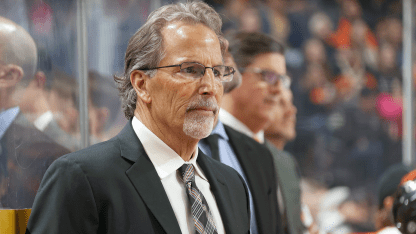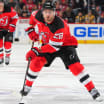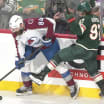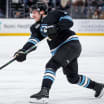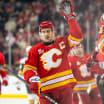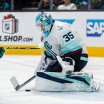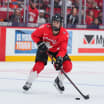John Tortorella has spent his NHL coaching career developing players into the best they can be.
As the oldest active coach in the NHL, the 66-year-old understands he also has a responsibility to help develop the next generation of coaches.
"I was so fortunate with the people and the mentors I have," Tortorella said. "If I can offer that ... I don't force myself on anybody, but if people want to ask me questions, I think that's a huge part of my job.
"It's an honor, quite honestly, for someone to ask me for an opinion as a young coach. I'll make time for that anytime."
Tortorella will become the seventh NHL coach, and first born in the United States, to reach 1,600 games when his Philadelphia Flyers play the New York Islanders on Thursday (7:30 p.m. ET; HULU, ESPN+). During his 23 seasons with the Tampa Bay Lightning, New York Rangers, Vancouver Canucks, Columbus Blue Jackets and Philadelphia Flyers, the branches from his coaching tree have spread throughout the NHL.
It's a group that includes Mike Sullivan of the Pittsburgh Penguins, Jared Bednar of the Colorado Avalanche, Sheldon Keefe of the New Jersey Devils and Martin St. Louis of the Montreal Canadiens.
"My time spent with John Tortorella in the Tampa Bay organization really set the foundation for me as a coach," said Keefe, who was a forward for three seasons (2000-03) under Tortorella with the Lightning. "I learned a tremendous amount from him that I applied to coaching and it was through the experience of being a part of an organization that was trying to raise the standard when 'Torts' came in and went through some very difficult times, both as a team and with some of the individuals. ... I was a part of that process of the team improving and seeing Torts do his work on a daily basis and how he challenged the group. It was not easy, it was not comfortable, but ultimately got to win and that process really showed me what's required in terms of creating at times uncomfortable situations, but showing love and commitment to your players at the same time, knowing that you're going in for their best interests and you're in for ultimately the best interest of the team."
Keefe reached the Stanley Cup Playoffs in his five seasons as coach of the Toronto Maple Leafs (2019-24) and now in his first season as coach of the New Jersey Devils has them poised to return to the postseason after they missed the playoffs last season.
"Seeing Torts at work really set that up for me and when I started coaching the NHL, I had an opportunity to thank him for that," Keefe said. "Which was a great opportunity for me. He's been incredibly gracious with his time."
Tortorella always has spread that generosity among his assistant coaches. Sullivan, who spent six seasons on Tortorella's staffs with the Lightning, New York Rangers and Vancouver Canucks, felt the assistant in his title was in name only.
"I never felt like an assistant coach; I felt like we co-coached," he said. "We were in it together and we coached together. We came to the rink every day and we were trying to find solutions to help our team grow and get better. I never, ever once felt like an assistant coach when I worked with him all those years."
Brad Shaw, in his third season as an assistant to Tortorella with the Flyers after working in the same role for five seasons with the Blue Jackets (2015-21), has had a similar experience. Tortorella repeatedly has stated that Shaw has full rein when it comes to Philadelphia's defensemen and penalty-kill units, from structure to in-game decisions on ice time.
"I think he relies on his assistants on the X's and O's side," Shaw said. "I think that he loves to get new ideas or find out what we're seeing when we watch the games back, or during the game on the bench what are we seeing. I think there's more interplay that way with him, certainly more than any other head coach I've worked with, especially at the NHL level. Also in practice, he gives us a lot of freedom as far as types of drills that we can implement. He'll give us 25-, 30-minute blocks of time where he kind of gives us a theme or something that wants to get accomplished and then gives us a free rein on how to do it, and what types of drills to do. So from that respect, it's fun to have that kind of impact or input as an assistant. Because with a lot of guys, they're not open to that kind of information."
Tortorella also gave Shaw and fellow assistants Rocky Thompson and Darryl Williams the chance to serve as acting head coaches after the Flyers were eliminated from playoff contention in 2022-23.
"I think I have responsibility to my coaching staff to help them develop," Tortorella said at the time. "I think we're all trying to develop just like the players are.
"Guys aspire to be head coaches and I think it's my responsibility to help develop and let them see and go through it."
Shaw also has worked as an assistant with the Lightning, New York Islanders, St. Louis Blues and Canucks during his 22 seasons in the NHL, and said he's worked under coaches where it felt like he was just standing on the bench with no authority.
Tortorella, though, makes sure his assistants know they're valued.
"I think he's a misunderstood guy in the game," Shaw said. "And I think the biggest misunderstanding is that he's this hard guy. He is one of the most interested in your family head coaches you could ever be around. And it's genuine, and you can tell it's genuine, and he cares. So the fact that he cares about developing us is great. The fact that he cares about us as people, and he cares about our family as people, probably for me, means just as much or more.
"I know that he cares about me and my family, and that's a fantastic thing to have as a head coach, is to have that that interest and that genuine passion and care for the people that are directly under you."
Bednar felt that passion when he coached Cleveland of the American Hockey League in 2015-16 while Tortorella coached the Blue Jackets, their NHL parent.
"Torts is great at sharing information and asking and wanting to know what's going on when you're in the minors, how the guys are doing, how they're playing, your input on how things are going, what your thoughts are on players," Bednar said. "Torts is an unbelievable communicator, not just with his team, but with other people in the organization. A good mentor. Two busy schedules so you don't get up there all the time, but he's really inclusive when you're part of his team and his organization."
That inclusivity carries to coaches who aren't in the same organization as Tortorella.
"There will often be a time where we'll be kibitzing in the room and a guy's name will come up, and he's like, 'I've go to text that guy. I haven't talked to him in a while,'" Shaw said. "He has a gigantic network of people that he keeps in touch with, and I think that's one of the more impressive things about him, is how many ex-players and coaches he stays in very regular contact with and keeps those relationships going.
"There are lots of coaches that have been impacted, and continue to be impacted, young and old. I think that's a real credit to how he's always done things."
Ryan Warsofsky is one of those young coaches. He interviewed for a job on Tortorella's staff that he didn't get, but they maintained a relationship that included a conversation before he was hired as San Jose Sharks coach June 13.
"I've got to know Torts pretty well, and I've talked to him a few times each summer and throughout the years," Warsofsky said. "He's an awesome guy for me to reach out to and lean on. When I made my move to the National Hockey League [as a Sharks assistant in 2022-23], he was the one guy I really leaned on for making this decision. He's a tremendous coach. Obviously he's got that old school mentality, but I've taken a lot from just talking to him alone."
Older coaches see that side of Tortorella as well. That includes Jeff Reese, who was an assistant and goaltending coach on Tortorella's staff for seven seasons with the Lightning, including the 2004 Stanley Cup championship.
"I still reach out when I want advice and when I want to talk about something," said Reese, the goaltending coach for the Dallas Stars since 2015. "And he's always there. I've heard from other coaches that I've coached with that are assistants that are trying to get jobs, and they've called him for a job. And I've heard back from many assistant coaches that this guy was unbelievable. He didn't hire me, but he was unbelievable. He called me back. He just respects the whole coaching situation, and he knows how tough it is. I can't say enough good things."
Conversations like that with young coaches like Warsofsky or veteran ones like Reese are part of what Tortorella feels is a responsibility because of the people he worked under as a young coach.
"I got to work under John Muckler, Jim Schoenfeld, Rick Dudley, who I owe everything to, who gave me my first [NHL] opportunity. ... Taught me how to work. I was so fortunate with the people and the mentors I have."
Tortorella was coach of the Virginia Lancers of the Atlantic Coast Hockey League when Dudley hired him as an assistant with the New Haven Nighthawks of the American Hockey League in 1988. And when Dudley was hired as coach of the Buffalo Sabres in 1989, he brought Tortorella along as his assistant.
He stayed with Buffalo as an assistant for six seasons, including four seasons under Muckler when he replaced Dudley in 1991. He was head coach of Rochester of the AHL for two seasons, then returned to the NHL as an assistant on Schoenfeld's staff with the Phoenix Coyotes (1997-99) and then went to the Rangers as Muckler's assistant in 1999. His first game as an NHL head coach came April 1, 2000, after Muckler was fired.
He went 0-3 with one tie in the Rangers' final four games of the season.
Tortorella was let go by the Rangers after his interim stint but was hired by Dudley, then the general manager of the Lightning, as an assistant to coach Steve Ludzik for the 2000-01 season. Tortorella replaced Ludzik on Jan. 7, 2001.
He coached 535 games in Tampa Bay during seven seasons, winning the Stanley Cup in 2003-04. He returned to coach the Rangers from 2008-09 to 2012-13, coaching in 315 more games. He spent one season as coach of the Canucks (82 games), then coached 447 games during six seasons with the Blue Jackets. Thursday will be his 217th game as Flyers coach.
He has a record of 765-635-162 with 37 ties.
Dudley said Tortorella's intelligence and work ethic stood out immediately, but one of the things that he sees in Tortorella now that Dudley felt was one of his strengths early on was an empathetic nature, and making sure everyone around him, from players to assistants to other team staff members, know they're appreciated.
"John's come a long way," Dudley said. "I don't know that he was ever not going to be a great coach. He's just become a more complete coach. A lot of the things that he uses now are things that were in his repertoire, he just had to get to the point where he comfortable in bringing them out. One of them was that genuine feeling that you care about somebody, and you care how well they're going to do.
"I think he does care, and I believe that the players know that now. I'm not sure they always did, but I think they do know now. And I think he's allowed that to come to the surface a little bit, and I like it. I think it's the way to be a successful coach in today's sports."
Dudley, a senior advisor for the Florida Panthers, says there are things that he did as a coach that he can see in Tortorella today, and is proud that his student has grown to become a mentor to others. And it's clearly a role Tortorella relishes.
"There's a lot of things I don't like doing," Tortorella said. "I love coaching the game. There's a lot of things I don't like doing, other than that. [Mentoring] is one of the most important, one of the things I love doing, because I get a chance to learn too, because you're talking with different minds. It's an honor for me to be able to talk to young coaches, if they're asking questions."
NHL.com senior draft writer Mike G. Morreale contributed to this report
